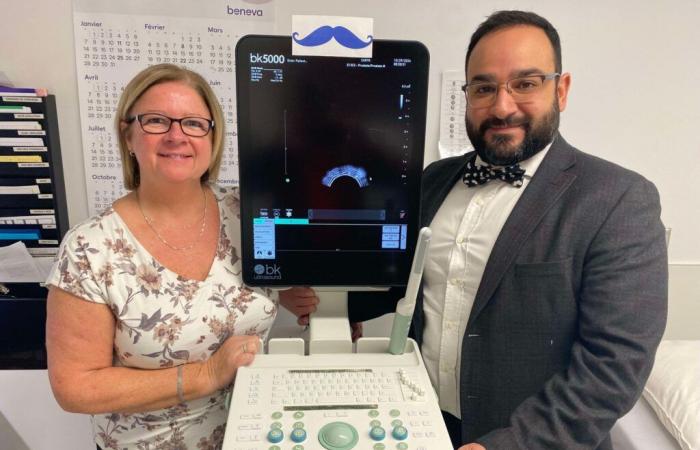The campaign A mustache for my CH is back for the entire month of November to bring the fight against male cancers into the light of day. It’s no secret: the subject is still taboo among men, despite the fact that prostate cancer hits one in three men hard.
Indeed, male cancers, such as prostate cancer, are often shrouded in silence. What is also no secret is that the prostate exam itself is feared, and then often derided among men. But what about this famous test?
“The first step is to talk about it with the family doctor who will refer for a blood test, then carry out a rectal exam. If there is an abnormality, the patient will then be referred to the urologist. A blood test is part of our arsenal. Just because the blood test is high does not mean the person has prostate cancer. On the other hand, a high blood test will push us to do other tests,” explains Mazen Jundi, urologist at CHAUR since 2015.
“Obviously, the prostate test with digital rectal examination is still the most reliable to date. This shouldn’t scare people because all of our medical students are trained for long hours to do this. Sure, it’s a little uncomfortable, but it’s not painful. I always tell the patient that it’s less worse than childbirth. Often they leave here and the usual phrase is always: “Ah, that was just it! » We’re trained to make people feel comfortable, so that’s often a false preconceived idea. »
By her own admission, Dr Jundi confirms that it is often women who push men to consult.
“That’s what we see most often, in fact,” he admits. In the majority of cases, life is good according to the gentleman and the lady looks at him, then intervenes. A meeting with a gentleman will take two minutes. A meeting with a gentleman and a lady will take 15 to 20 minutes. She peels it from top to bottom. This is why married men live longer than single men! »
“The main signs are that there are none”
“It’s a bit like testicular cancer. Why do we often diagnose it late? This is because here too, men are slow to come and consult us despite the fact that the patient notices that he has an anomaly. They often fear having cancer, so they don’t dare talk about it. It’s the fear of being told they have cancer. We know that prostate cancer is very common. One in three people will be diagnosed with cancer and it should be caught at the lowest stage. At stage 4, it has become metastatic and there is nothing we can do except prolong the person’s life. »
With today’s medicine, it is possible to extend life by 3 to 5 years when the cancer is at stage 4.
Men are invited to consult as soon as symptoms of abnormality appear. Otherwise, you should start talking to your family doctor about it from the age of 50. If a family member has already had prostate cancer, it is recommended to be screened ten years before (around age 40).
“It remains a very sneaky disease,” he adds. The main signs are that there aren’t any. We treat a disease where people feel good. In total, 60% to 70% of people who are diagnosed with a diagnosis are asymptomatic. »
For several days now, the month of November has been here to transform these silences into open discussions.
Prostate cancer screening clinic
In addition, a prostate cancer screening clinic will be organized to offer men, with or without a family doctor, rapid and confidential access to screening exams, from November 11 to 22.
By showing up from Monday to Friday, between 11 a.m. and 2 p.m., at room B-210 of the Center St-Joseph (located at 731 rue Ste-Julie), in Trois-Rivières, and bringing their hospital card and/or or health insurance, men with a family history of prostate cancer, urinary difficulties or concerns will receive a packet containing a request for a blood test, as well as expedited access to a urologist.






